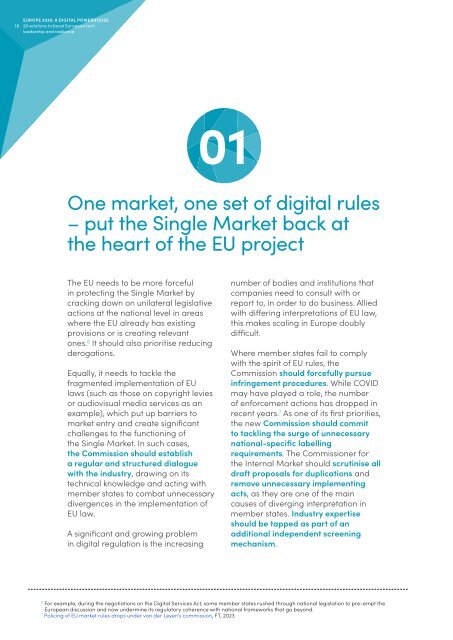DIGITALEUROPE - EUROPE 2030 A DIGITAL POWERHOUSE FINAL WEB_PBP
You also want an ePaper? Increase the reach of your titles
YUMPU automatically turns print PDFs into web optimized ePapers that Google loves.
16<br />
<strong>EUROPE</strong> <strong>2030</strong>: A <strong>DIGITAL</strong> <strong>POWERHOUSE</strong><br />
20 solutions to boost European tech<br />
leadership and resilience<br />
01<br />
One market, one set of digital rules<br />
– put the Single Market back at<br />
the heart of the EU project<br />
The EU needs to be more forceful<br />
in protecting the Single Market by<br />
cracking down on unilateral legislative<br />
actions at the national level in areas<br />
where the EU already has existing<br />
provisions or is creating relevant<br />
ones. 6 It should also prioritise reducing<br />
derogations.<br />
Equally, it needs to tackle the<br />
fragmented implementation of EU<br />
laws (such as those on copyright levies<br />
or audiovisual media services as an<br />
example), which put up barriers to<br />
market entry and create significant<br />
challenges to the functioning of<br />
the Single Market. In such cases,<br />
the Commission should establish<br />
a regular and structured dialogue<br />
with the industry, drawing on its<br />
technical knowledge and acting with<br />
member states to combat unnecessary<br />
divergences in the implementation of<br />
EU law.<br />
A significant and growing problem<br />
in digital regulation is the increasing<br />
number of bodies and institutions that<br />
companies need to consult with or<br />
report to, in order to do business. Allied<br />
with differing interpretations of EU law,<br />
this makes scaling in Europe doubly<br />
difficult.<br />
Where member states fail to comply<br />
with the spirit of EU rules, the<br />
Commission should forcefully pursue<br />
infringement procedures. While COVID<br />
may have played a role, the number<br />
of enforcement actions has dropped in<br />
recent years. 7 As one of its first priorities,<br />
the new Commission should commit<br />
to tackling the surge of unnecessary<br />
national-specific labelling<br />
requirements. The Commissioner for<br />
the Internal Market should scrutinise all<br />
draft proposals for duplications and<br />
remove unnecessary implementing<br />
acts, as they are one of the main<br />
causes of diverging interpretation in<br />
member states. Industry expertise<br />
should be tapped as part of an<br />
additional independent screening<br />
mechanism.<br />
6<br />
For example, during the negotiations on the Digital Services Act, some member states rushed through national legislation to pre-empt the<br />
European discussion and now undermine its regulatory coherence with national frameworks that go beyond.<br />
7<br />
Policing of EU market rules drops under von der Leyen’s commission, FT, 2023



